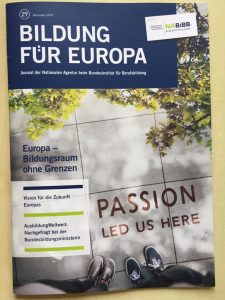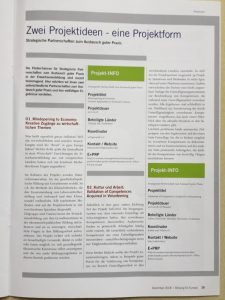Erasmus+ Partnership for Adult Education
This project brings 4 organisations from East, West and Central Europe together to exchange good practises in economic learning by combining a) creative approaches of civic education, b) economic issues such as labour market and employability, money, management skills for life, environmental economics, consumer behaviour and c) a European perspective on recent macro-economic developments. In order to allow a democratic learning, partners seek to reflect these questions in a multi-perspective way taking different economic “schools” into consideration.
As project’s result, the consortium produces teaching material to be applied in adult and citizenship education.
![]()
Projekt als Beispiel guter Praxis
Dieses Projekt wurde von der Nationalen Agentur Bildung für Europa der Europäischen Union als “Beispiel guter Praxis” gewürdigt. Im Journal der Agentur “Bildung für Europa” findet es auf S. 29 Erwähnung. 🙂
Climate Change
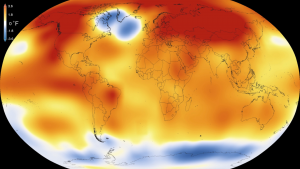 The changing temperatures, extreme events, ocean acidification, declining arctic sea ice and many more phenomenons give significance of the current global warming trend. Is it the result of human activity? Most of the researchers say: definetely, yes! For an overview see the arguments given by the NASA. In which way is this linked to economy? Among many other reasons, the energy supply of the 19th and 20th century was mostly based on the burning fossil fuels.
The changing temperatures, extreme events, ocean acidification, declining arctic sea ice and many more phenomenons give significance of the current global warming trend. Is it the result of human activity? Most of the researchers say: definetely, yes! For an overview see the arguments given by the NASA. In which way is this linked to economy? Among many other reasons, the energy supply of the 19th and 20th century was mostly based on the burning fossil fuels.
Picture: NASA Scientific Visualization Studio – https://svs.gsfc.nasa.gov / Goddard Space Flight Center – https://www.nasa.gov/centers/goddard – http://www.nasa.gov/sites/default/files/thumbnails/image/16-008.jpeg, Public Domain, https://commons.wikimedia.org/w/index.php?curid=46523508
Example of Good Practice
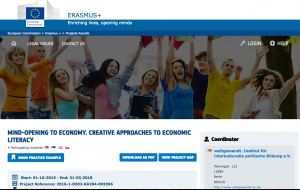
Our project has been chosen as an Example of Good Practice. Our work makes sense. We are happy. 🙂 See the Erasmus+ projects results platform.
Die Donut-Ökonomie: eine neue Sicht auf Wirtschaft und Gesellschaft
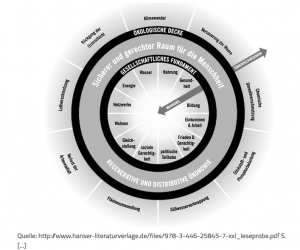
Finanzkrisen bzw. ein instabiles Finanzsystem, Klimawandel, soziale Polarisierung und weiteres mehr stimulieren zu Innovationen im ökonomischen Denken. Wirtschaftswissenschaftler/innen sind gefordert, soziale und ökologische Perspektiven zusammenzudenken und Auswege zu ersinnen. Die britische Ökonomin Kate Raworth hat sich der Aufgabe unterzogen und das Buch “Die Donut-Ökonomie” veröffentlicht. Es liegt auch in deutscher Übersetzung vor.
DOUGHNUT ECONOMICS, new economic thinking?
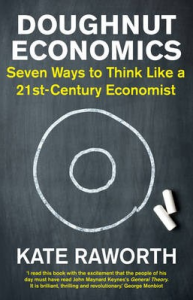
The book “Doughnut Economics” by Kate Raworth provoked controversial debates on the need to broaden the horizons of economic thinking. George Monbiot calls it in The Guardian “… a breakthrough alternative to growth economics”.
ZUKUNFT 4.0: Die Digitalisierung von Wirtschaft und Gesellschaft
Im Ergebnis des ECOLIT-Projekts sind Materialien für die Bildungsarbeit zur Digitalisierung entstanden. Der thematische Aufriss beinhaltet eine kurze Darstellung der Geschichte von Industrie 1.0-4.0, technologische Aspekte des Wandels (künstliche Intelligenz und Algorithmen, Roboter, 3D-Druck), Auswirkungen auf die Gesellschaft, die politische Steuerung des Wandels und die Rolle, die der Bildung dabei zukommt. Die Materialien umfassen außerdem Übungen, die Trainer/innen der Erwachsenenbildung in ihren Kontexten anwenden können.
FUTURE 4.0: The Digitisation of Economy and Society
 During the ECOLIT project, partners developed teaching material on the subject of digitisation. It contains an introduction to the history of industry 1.0-4.0, technological aspects (like artificial intelligence and algorithm, robotics, 3D printing), impacts on society, the political framing of the developments and the role of education. Moreover, the material provides exercises and games for trainers in adult education.
During the ECOLIT project, partners developed teaching material on the subject of digitisation. It contains an introduction to the history of industry 1.0-4.0, technological aspects (like artificial intelligence and algorithm, robotics, 3D printing), impacts on society, the political framing of the developments and the role of education. Moreover, the material provides exercises and games for trainers in adult education.
Dissemination Event, London 26 January 2018
The ECOLIT project was presented in the UK during a 1-day dissemination event which was held in London on the 26th January 2018. Attending the event were both local participants, such as members of charitities and other organisations working with disadvantaged groups, as well as international participants, namely a delegation from Belgium who were managerial staff of a network of partner schools. During the event the project and its outcomes were presented, and also participants in training events shared their experiences in the project and what they had learned.

Economic Literacy live
Representatives of weltgewandt e.V. and the partner organisations EDUcentrum (CZ), Peipsi CTC (EE) and Kairos Europe (UK) met each other in Berlin from 15th to 17th February 2018 and continued working on the project results. We create teaching material on digitisation in the workplace / work 4.0. Soon online!
Schools of Economic Thoughts
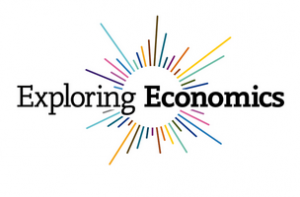 The Network for Pluralist Economics runs the project Exploring Economics. It provides basic information on central problems of economic thinking and different perspectives of economics. You get orientation on Neoclassical Economics, Marxian Political Economy, Austrian Economics, Post-keynisian Economics, etc.
The Network for Pluralist Economics runs the project Exploring Economics. It provides basic information on central problems of economic thinking and different perspectives of economics. You get orientation on Neoclassical Economics, Marxian Political Economy, Austrian Economics, Post-keynisian Economics, etc.
Artificial Intelligence and Robots: Paradise Conditions at the Price of Submission?
During our project on Economic Literacy we also focus on the digitalisation of economy, often called „industry 4.0“ or „work 4.0“. Our public discussion event with colleagues from the partner’s countries helped structuring a broad and complex theme. We discussed chances and challenges and the need of democracy to combine new opportunities with growing welfare for all. An inspiring exchange!
Unterrichtsmaterialien: Ökonomie und Gesellschaft
 Die Bundeszentrale für politische Bildung veröffentlichte in ihrer Reihe “Themen und Materialien” den Band “Ökonomie und Gesellschaft”. Die wissenschaftliche Leitung lag bei Prof. Dr. Bettina Zurstrassen. Der Band ist als Download frei verfügbar. Eine Zusammenfassung der einzelnen Bildungsbausteine bietet die Inhaltsübersicht.
Die Bundeszentrale für politische Bildung veröffentlichte in ihrer Reihe “Themen und Materialien” den Band “Ökonomie und Gesellschaft”. Die wissenschaftliche Leitung lag bei Prof. Dr. Bettina Zurstrassen. Der Band ist als Download frei verfügbar. Eine Zusammenfassung der einzelnen Bildungsbausteine bietet die Inhaltsübersicht.
